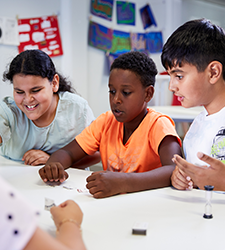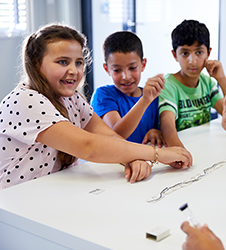Projects

MORAL
The research project MORAL investigates the socio-moral development of children and adolescents with a strong focus on intergroup processes and social cognition. Another focus of the project is the training of educators and teachers regarding social exclusion among children and adolescents.

MotivO
Project MotivO aims at investigating and comparing motivational aspects of reading achievement across orthographies (German vs. Hebrew). Within the context of a cooperation project, German and Israeli 2nd and 4th Graders will be compared regarding their reading motivation and reading achievement in a cross-language research design to detect positive or negative feelings towards reading as well as changes across time.

MuKi
Investigating emotional expectation and appraisal processes in children aged 8-12

MultiDiskurs
The project aims to account for patterns of variation in the processing of linguistic structures in discourse. In particular, we investigate how bilingual children ranging in age from 8 to 12 integrate morphosyntactic and discourse information, for example by using eye-tracking experiments. Among the factors that contribute to individual variation, we explore the role of cross-linguistic influence, differences in bilingual profiles in terms of language and literacy exposure, individual cognitive skills and bilinguals’ ability to share discourse strategies across their two languages.

MultiDynAssess-India
The project designs, implements, and evaluates multilingual dynamic assessment (DA) in Indian primary government schools where English is taught in a context characterised by high sociolinguistic diversity and widespread code-mixing practices. It investigates how multilingual versus English-only DA affects Grade 4 students’ language and content learning over time, drawing on classroom observations and a longitudinal comparison with traditional static assessment in schools in New Delhi and Guwahati. By aligning assessment with learners’ full linguistic repertoires, the project aims to promote equity in education and offers implications for multilingual assessment practices in India and other linguistically diverse contexts in the Global South.

NawiSelf*digital
The aim of the project is to investigate the effectiveness of teaching units for primary school science that integrate the use of digital media.

NEDA
The project NEDA investigates the relationship between the development of reading and spelling skills and the development of neural auditory processing in elementary school children.

NEIS
Project NEIS is concerned with the development of self-regulatory skills – the ability to perform goal-oriented behavior – in children aged between 5 and 8 years.

NeO
The discussion regarding “more male nurses in kindergardens” is currently present internationally. The public discussion involves multiple attributes for girls and boys as well as for their female and male nurses. The NeO Project sheds light on the nurses’ perspectives regarding the meaning of gender within early childhood education.

NeuroBind
The project NeuroBind investigates the neural bases of the attachment system in children with different attachment styles using neuroimaging techniques (structural and functional magnetic resonance imaging). To activate their attachment system, children are shown different attachment relevant pictures and are asked to imagine themselves in secure and dangerous social situations. Correlations between brain activity and emotional reactions in response to those specific social situations are analyzed.